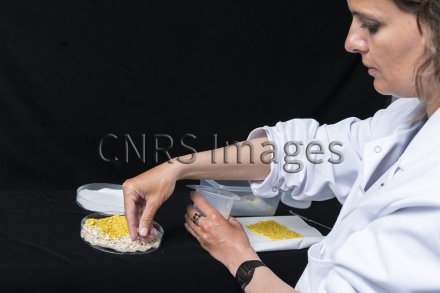Production year
2017

© Cyril FRESILLON/CRCA /CNRS Images
20170048_0155
Feeding the social amoeba Physarum polycephalum, commonly referred to as the "blob", with rolled oats. This primitive, unicellular organism grows in damp environments and feeds on bacteria and fungi, which it digests using chemical substances. In the laboratory, research scientists feed it with rolled oats. If it is fed correctly, it can double in size each day and grow to measure up to 10 m2. If it dries out, it forms a sclerotium (the overwintering form of fungi) and eliminates accumulated toxicity. Just a few drops of water are all it takes to revive it. Its numerous characteristics include the capacity, despite the fact that it does not have a brain, to learn from its experiences and pass on the information learned to other individuals by fusing with them. Lastly, it has a venous system that forms according to the same physical laws that govern the vascularisation of cancerous tumours, which means it could be used as a model.
The use of media visible on the CNRS Images Platform can be granted on request. Any reproduction or representation is forbidden without prior authorization from CNRS Images (except for resources under Creative Commons license).
No modification of an image may be made without the prior consent of CNRS Images.
No use of an image for advertising purposes or distribution to a third party may be made without the prior agreement of CNRS Images.
For more information, please consult our general conditions
2017
Our work is guided by the way scientists question the world around them and we translate their research into images to help people to understand the world better and to awaken their curiosity and wonderment.